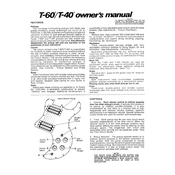Peavey T-40 Owner's Manual


To adjust the action on your Peavey T-40, use an Allen wrench to turn the truss rod, which is accessible at the headstock. Adjust carefully to achieve the desired neck relief, and then use the bridge saddles to fine-tune the string height.
Use a microfiber cloth to gently wipe down the body of the guitar. For deeper cleaning, apply a small amount of guitar polish specifically formulated for the finish of your T-40. Avoid harsh chemicals that can damage the finish.
Begin by loosening and removing the old strings. Then, thread the new strings through the bridge and wrap them around the tuning pegs, ensuring they are tight and properly seated. Tune the guitar to the desired pitch.
Check for loose hardware such as tuning pegs and bridge components. Ensure the neck is properly adjusted and that the frets are even. If the buzz persists, it may be necessary to consult a professional for a setup or repair.
Set the neck pickup to full volume and tone, and blend in the bridge pickup to taste. Experiment with the phase switch to find the sweet spot for your desired rock tone.
Regular maintenance should be done every 6 months, which includes cleaning, string changes, and checking for any hardware issues. A professional setup is recommended at least once a year or whenever significant changes in performance are noticed.
While many standard bass cases will fit the T-40, it is recommended to use a case specifically designed for its unique shape to ensure proper protection. Ensure the case is well-padded and securely holds the guitar in place.
First, check all connections and ensure the output jack is secure. If the issue persists, inspect the wiring for any loose or broken connections. It may be necessary to replace faulty components or consult with a professional technician.
Ensure all shielding is intact and consider adding additional shielding to the control cavity. Check the grounding of the guitar, and use high-quality cables to minimize interference. Adjusting the pickup height may also help reduce noise.
The Peavey T-40 performs well with medium-gauge nickel-plated steel strings, which offer a balanced tone and good durability. However, the best choice ultimately depends on your playing style and tonal preference.